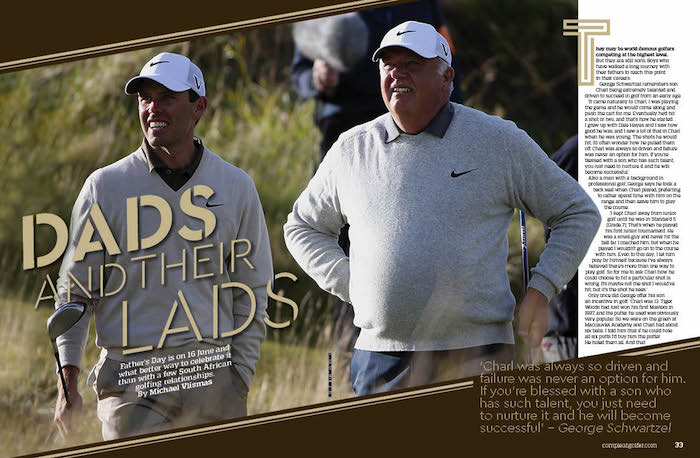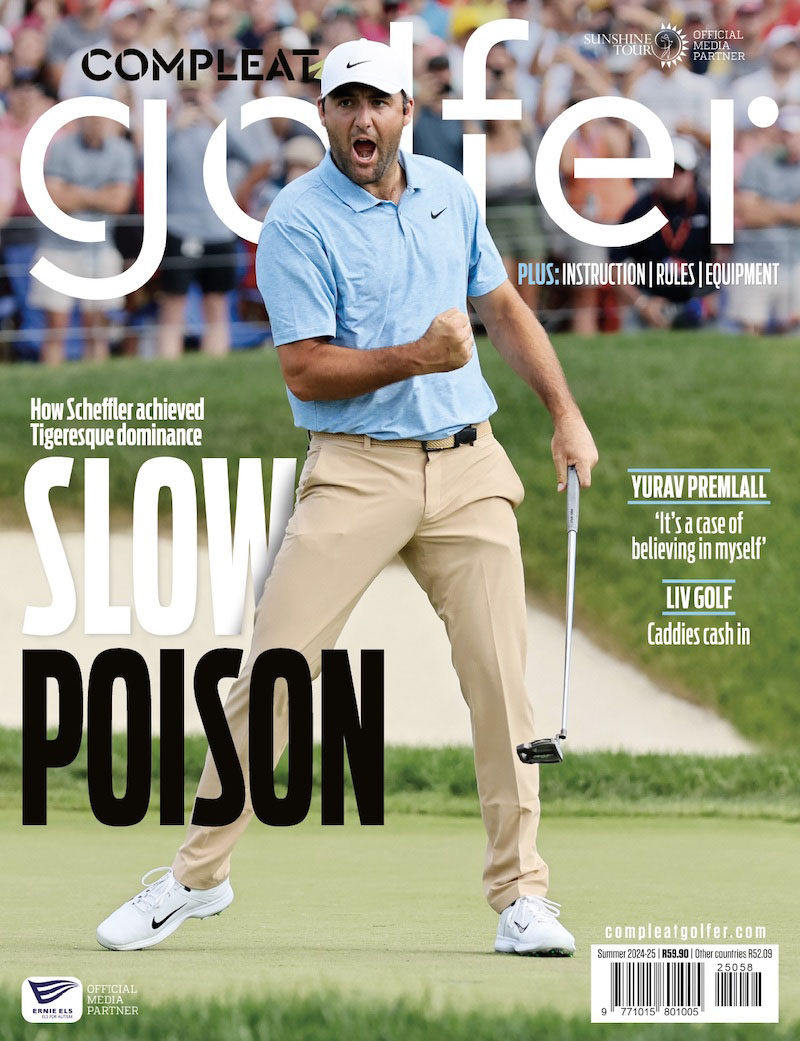Father’s Day was on 16 June and what better way to celebrate it than with a few South African golfing relationships, writes MICHAEL VLISMAS.
They may be world-famous golfers competing at the highest level.
But they are still sons. Boys who have walked a long journey with their fathers to reach this point in their careers.
George Schwartzel remembers son Charl being extremely talented and driven to succeed in golf from an early age.
‘It came naturally to Charl. I was playing the game and he would come along and push the cart for me. Eventually he’d hit a shot or two, and that’s how he started. I grew up with Dale Hayes and I saw how good he was, and I saw a lot of that in Charl when he was young. The shots he would hit, I’d often wonder how he pulled them off. Charl was always so driven and failure was never an option for him. If you’re blessed with a son who has such talent, you just need to nurture it and he will become successful.’
Also a man with a background in professional golf, George says he took a back seat when Charl played, preferring to rather spend time with him on the range and then leave him to play the course.
‘I kept Charl away from junior golf until he was in Standard 5 [Grade 7]. That’s when he played his first junior tournament. He was a small guy and never hit the ball far. I coached him, but when he played I wouldn’t go on to the course with him. Even to this day, I let him play by himself because I’ve always believed there’s more than one way to play golf. So for me to ask Charl how he could choose to hit a particular shot is wrong. It’s maybe not the shot I would’ve hit, but it’s the shot he sees.’
Only once did George offer his son an incentive in golf. ‘Charl was 13. Tiger Woods had just won his first Masters in 1997, and the putter he used was obviously very popular. So, we were on the green at Maccauvlei Academy and Charl had about six balls. I told him that if he could hole all six putts I’d buy him the putter. He holed them all. And that putter was expensive. Me and my big mouth. That was the first and last time I offered him a reward for something like that.’
It was during The PGA Championship that Kevin Stone’s WhatsApp beeped. ‘Pops. Have a look at this and tell me what you see,’ was the message from son Brandon. It was a video of his swing. Kevin told him what he saw. A few minutes later his WhatsApp beeped again. ‘Spot on, pops. Thanks.’
Almost every professional golfer can tell the same story. There was that first time Dad took him to the golf course and he pushed the cart or hit one or two shots during the round. That first time Dad gave him a cut-down club to play with. For many, there was a dad who led them to golf.
‘Brandon was pretty good when he was young. He was a scratch when he was 13 or 14,’ says Kevin, whose approach to fathering a golf prodigy was different to most. For a start, he was a professional and knew the life his son would be going into. And then he did something most dads who have a talented golfer on their hands wouldn’t dream of doing. He took Brandon’s clubs away and wouldn’t let him play golf for a year.
‘I always wanted him to play team sports because there’s no lonelier sport out there than golf. In golf there’s nowhere to hide and you have nobody to blame except yourself. So when Brandon was about 14 I took his golf clubs away from him. He went and played cricket and soccer and was very good at both. Eventually he came to me and said he really wanted to play golf. I was honest with him. I told him it would be extremely difficult and he would face adversity week in and week out, and he said he still wanted to do it,’ says Kevin.
The advice he gave his son at the start of his career is something Brandon draws on to this day.
‘I told him two things. First, that he needs to try his best on every single golf shot he hits. I told him he needs to be able to walk off the golf course, having shot 60 or 80, and have no regrets that he didn’t try his level best on every single shot. The second thing is that he needs to go out there and have fun, because playing golf is fun. If you’re not having fun doing something outdoors and earning a living where you don’t have to answer to anybody except yourself, you need to go find something else to do.’
Kevin is also there to keep motivating and supporting his son, even at this point in Brandon’s career.
‘That’s been the case for most of his career. From him going to the European Tour Qualifying School about six years ago, leading there and then getting food poisoning and finishing with two double-bogeys in a row and missing his Tour card; then getting on the Challenge Tour, going back to Tour School and missing his card again; then coming back to South Africa and winning the Cape Town Open and the South African Open, and then everybody expecting him to win Majors thereafter, it’s not that easy for him. He started expecting more from himself than anybody else and obviously you get down on yourself when it doesn’t go your way. He was struggling again last year, then won the Scottish Open and all of a sudden he was off again.
‘I just keep telling him to relax and that he’s good enough. Just to go out there and play golf. Obviously, as a father it’s fantastic to see him succeed and you’re proud. But I’m more proud of the way he handles adversity. Yes, it’s frustrating when you see him miss cuts or not play well, but I know he’s doing his best.
‘I’ll never forget when he was a young amateur. He played in a tournament and I couldn’t be there with him. He didn’t play very well. Anyway, when he came home, I said to him: “Tell me, how on earth did you make seven on 18? That’s the easiest par five on that golf course.” Brandon looked at me and said: “You know what, Pops, I made seven on that hole just to piss you off.” It was a lovely way on his part to remind me that he wasn’t trying to make seven and was trying his best. It was a brilliant answer and a good reminder for me too.’
Ray Frittelli says he always knew son Dylan would become a great golfer, and he backed this up by telling him from an early age he was a great sportsman.
‘From early on in his life I’d tell him he was really good at whatever sport he played. We used to play cricket in the garden and he’d have his wicketkeeper gloves on. He’d ask me to throw a few wide balls so he could dive. So he’d dive and catch these balls, and I’d say to him, “Not even Jonty Rhodes could’ve caught that one.” And he would say, “Really Dad? Really?”
‘I still motivate him in small ways. I’ll send him messages before a round to say good luck and play well. One thing I don’t do is discuss golf with him. I’m not a golfer and he knows much more about golf. So I just motivate him where I can.’
Ray recalls Dylan being a toddler when he started asking to be taken to the driving range. ‘He’d wake me up on a Saturday morning and beg me to take him to the driving range. He loved all the sports, but he would always come back to golf as his first love.
‘It’s a long road and there are no shortcuts, but as a father I’m just pleased he can play at such a high level and enjoy what he does. He absolutely loves his golf and is fully committed to it.
‘From a young age I would tell Dylan to never ever, ever give up. He’s remembered that. In soccer he would rush to pick the ball out of the net and see if his team could equalise or win the game with the next goal. He never gives up, even to this day. When he’s not playing well he still grinds it out.’
Although they made the decision for Dylan to specialise in golf at the age of 15, Ray recommends fathers allow their kids to play all sports while growing up.
‘That’s the only way they’ll choose their own sport and not the one the parent chooses for them. And when they start playing in junior golf tournaments, parents shouldn’t walk the course with them. Leave them out there with their friends to learn the game from each other.’
And the one piece of advice for other fathers? Don’t push your child.
Says George Schwartzel: ‘Let him decide what he wants to do. If he wants to play golf, support him all the way. If he doesn’t, don’t force him. You can’t live their life for them. They need to decide what they want to do. They make huge sacrifices and don’t have a normal childhood. From the age of 14 Charl has travelled. It’s hard.’
Whether they’re wearing Green Jackets or flying in private jets, they still have a dad somewhere who worries about them, wants to keep motivating them and who loves to receive a WhatsApp now and again from somewhere in the world from that little boy who was once so small he couldn’t walk a full 18 holes, and so would take a break by sitting on the seat of his dad’s Gemini golf cart. As Charl Schwartzel used to do.
‘You know, whatever he does or doesn’t do in his golf career, he is my son and I will always be proud of him,’ says George. ‘That’s the bottom line.’
– This feature first appeared in the June issue of Compleat Golfer, now on sale








